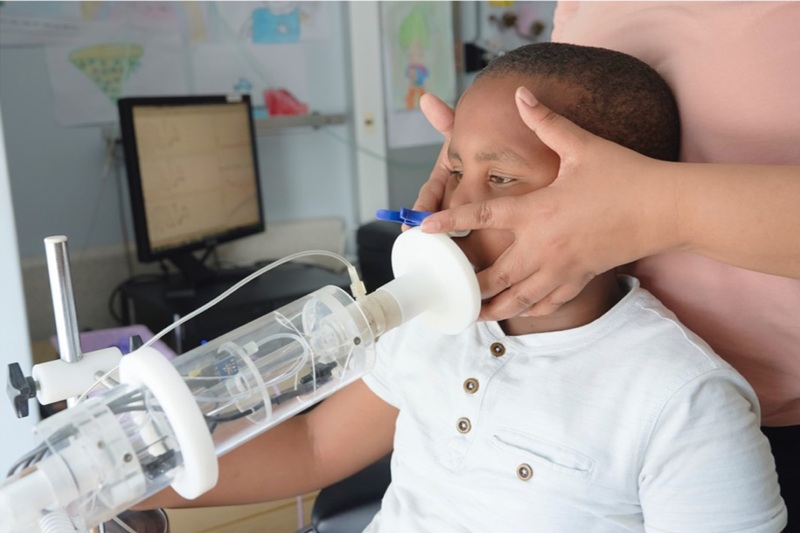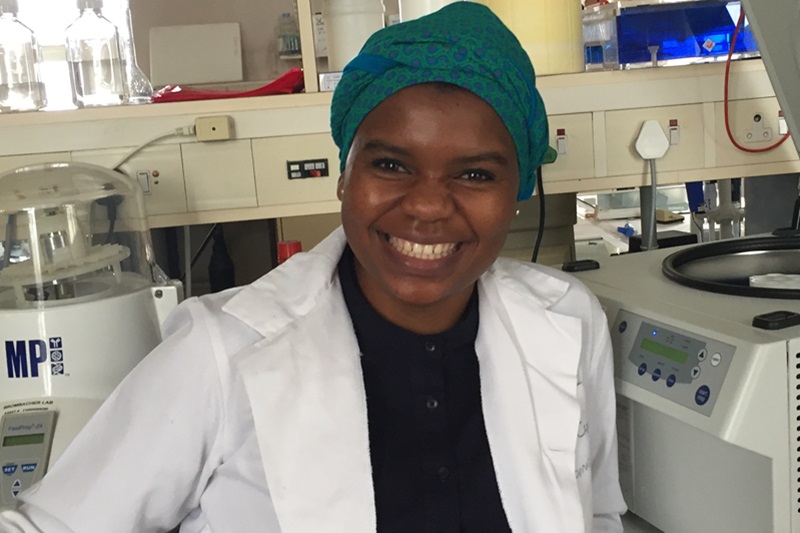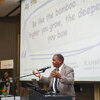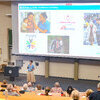Carnegie-UCT’s ‘institutional ubuntu’ funds African emerging researchers
06 November 2025 | Story Sarah Marriott. Photo Paed Med Drakenstein Pulmonology. Read time 8 min.
The University of Cape Town (UCT) recently secured extra-ordinary awards from Carnegie (Carnegie Corporation of New York) funding in support of postdoctoral research fellows. This ensures continued investment in a rising cohort of scholars who will shape the future landscape of cutting-edge research and academic leadership in Africa.
For over a decade, a unique Carnegie-UCT partnership has provided an interdisciplinary, pan-African platform, the Developing Emerging Academic Leaders (DEAL) project. Co-ordinated by the Postgraduate Studies and Researcher Development Directorate (D:PGRD) in collaboration with the Institute for Humanities in Africa (HUMA), DEAL offers fellowship funding and skills enrichment in the sciences and humanities across accredited research units at UCT.
The directorate was able to grant a total of 18 postdoctoral awards for 2026 across five faculties; plus six pro-rata fellowships for 2025 to research units primarily in the Faculty of Health Sciences. These are in addition to the ‘regular’ Carnegie DEAL cohorts.
“This DEAL 3 Additional Postdoc Cohort funding of almost R7 million is unprecedented given the broader context of a world with such limited funding available,” said Dr Thierry Luescher, director of Postgraduate Studies and Researcher Development.
Dr Nelleke Bak, project manager in the PGRD team explained that the special award of fellowships was specifically designed to support research units and researchers who identified an immediate need. The additional fellowships were awarded solely from exchange rate gains and interest earnings on the existing DEAL grant.
“We sought to identify and avail whatever resources we could mobilise,” Dr Luescher added, “to close unexpected financial gaps caused by recent international funding withdrawals across the board, while contributing to the original grant’s purpose.”
The DEAL project aims to amplify African scholarship excellence and develop the continent’s most talented, emerging academics at doctoral, postdoctoral and junior research fellow levels by bringing them to UCT and introducing them to its Africa-wide and global research networks. Carnegie fellows receive cutting-edge research training within their assigned research units; augmented by training in engaged scholarship, research integrity, leadership skills and workshops on how to make social impact and translate complex scientific knowledge for public engagement and application.
“As the institution-wide custodian of excellence, transformation and sustainability in postgraduate studies and researcher development, we wanted to make an example of 'institutional ubuntu',” Dr Luescher said, “to showcase what it means to be working together to help one another out in these extraordinary times”.
We wanted to make an example of 'institutional ubuntu' to showcase what it means to be working together to help one another out.
A selection of the PDRF and principal investigator (PI) awardees described the emotional significance of receiving the DEAL award and shared their thoughts on the impact of this funding on their research.
Developing vaccines in Africa, for Africa

Dr Ntombi Benede, a research fellow based in the Institute of Infectious Disease and Molecular Medicine (IDM) explained how this award would alleviate funding pressure and validate her research. “I am relieved and joyful because when we applied, I was doubting myself and the research a bit at this postdoc level. I am also so happy that I will be able to continue with my co-supervision commitment in line with the current project.”
The project is directly supervised by Dr Roanne Keeton with Professor Wendy Burgers as PI. Dr Keeton noted that one of the highest burdens of respiratory diseases in low-middle income countries is Respiratory Syncytial Virus (RSV). “But there's currently no widely available RSV vaccine in South Africa,” she said. “This funding lets us leverage Ntombi’s expertise because she's already trained on the downstream analysis needed, so we’re improving efficiency and timelines”.
Building capacity for precision medicine research on the continent

Dr Phuti Choshi, based in the Division of Allergology and Clinical Immunology (Department of Medicine) with Professor Jonny Peter and team, study drug hypersensitivity in HIV and tuberculosis (TB) to understand why some individuals develop life-threatening cutaneous reactions to medications commonly used in HIV/TB treatment, while others do not.
Dr Choshi described receiving the award as “humbling and affirming” amid scarce research funding. “This recognition brings a profound sense of relief and serves as a powerful signal to a young, emerging researcher to keep believing in the pursuit of scientific discovery,” she said.
“This award sustains momentum and strengthens local expertise,” Choshi added. “Our findings could directly inform better diagnostic tools for identifying causative drugs and guide the development of targeted therapies for vulnerable populations, ultimately improving the safety and effectiveness of treatment for millions of patients.”
Transforming the cancer healthcare landscape in South Africa and beyond

Dr Gael Siwe, a postdoctoral scientist in Chemical and Systems Biology with Professor Stefan Barth, said he received the award with genuine pride and gratitude as a timely intervention amid US funding cuts and UCT budgetary pressures. “It offers much-needed breathing room to continue my work with focus and purpose,” he said. “This support is both a recognition of my potential and an investment in quality research that might otherwise have been interrupted.”
The Medical Biotechnology and Immunotherapy Research Unit (MB&I) develops world-leading immunodiagnostic and therapeutic innovations at the forefront of precision oncology, particularly in cancers prevalent among African women.
“This milestone will position the project to engage with venture capital and philanthropic partners, creating a pathway toward potential first‑in‑human clinical trials,” Dr Siwe said. “Beyond advancing my own research journey, this award could help translate IP [intellectual property] into entrepreneurial solutions delivering innovative, affordable and locally relevant cancer therapies.”
Abstract work with immediate real-world implications

Having just finished his PhD, Mita Ramabulana is at a critical stage of his career, eager to develop a scientific profile and establish himself within the scientific community. Associate Professor Elena Berdysheva in the Department of Mathematics and Applied Mathematics explained that to secure funding in pure mathematics is a very difficult task. This fellowship offers an ideal platform because it not only provides generous funding, but also emphasises the development of the fellow. “We met this news with relief, and of course I was very proud,” she said.
Ramabulana’s research is in Harmonic Analysis. "One of the optimisation problems I considered for my PhD has an application to both geometry and statistical methods that are fundamental in the modelling of geophysical, climatological and atmospheric phenomena,” he said.
Healthcare that makes the future for children, families and communities better

For Dr Shaakira Chaya, it was with both a sense of relief and joy that she received this support after international funding cuts threatened her team’s long-term birth cohort study. “Having worked on this project for six to seven years under Professor Diane Gray’s mentorship, I’m grateful to be able to continue this important work rather than see it come to an abrupt end,” she said.
Professor Gray in the Department of Paediatrics and Child Health explained: “The focus of the work is to improve our understanding of respiratory disease in early childhood, and how to prevent it, identify it and manage it. The skills that Shaakira developed during her PhD are really quite unique internationally. She’ll now be able to continue transferring these skills to other projects.
“Postdoc fellowships are absolutely crucial in changing the story,” Gray added. “It is such a critical point in capacity development because this is the time when postdocs are able to develop their own teams, develop research culture, use the data in its fullness, make their own leadership decisions and drive the research questions.”
Plans for 2026 and beyond
Carnegie has supported fellowships at UCT since 2013, and a fourth and final round of DEAL/HUMA fellowships is currently in discussion with the foundation. This will ensure continued funding until 2028 and provide the resources for institutionalising and mainstreaming key project components so that they become accessible to all postgraduates and emerging researchers at UCT.
 This work is licensed under a Creative Commons Attribution-NoDerivatives 4.0 International License.
This work is licensed under a Creative Commons Attribution-NoDerivatives 4.0 International License.
Please view the republishing articles page for more information.
Faculty of Health Sciences News
























